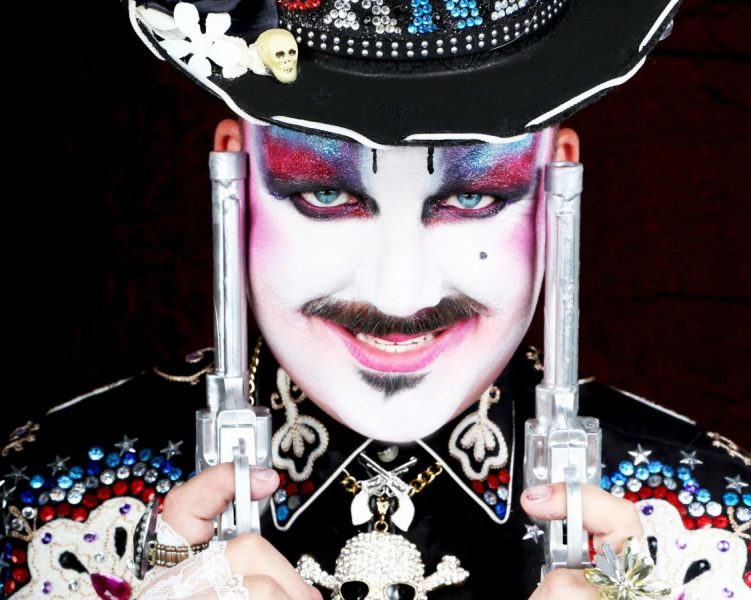Neil Arthur James’s alter ego Dandy Darkly is back in Edinburgh for a third year with a brand new show, Trigger Happy. This time channeling an all-American, eclectic kool-aid acid cowboy, Darkly’s deceptively devious morality tales of contemporary America marks a coming of age for the character. I catch up with James on a quiet lunchtime at the venue, CC Blooms, to talk about this already award-winning (the Bindlestiff First of May Award which enabled his UK trip) production.
Dandy Darkly has evolved as an organic, some would say monstrous, character deeply rooted in James’s love of the oral story-telling tradition. He has eight-track recordings of himself at five years old telling ghost stories, recalling, ‘My grandfather instilled in me such a love of storytelling, so in many ways this persona [Darkly] is taking on the oral traditions of storytelling, particularly from the South in the US.’ Most would consider this to be a highly conservative part of the States, James feels he ‘lucked out’ with his supportive, liberal parents and his fascination for ‘the old Hollywood Cissies’, particularly Paul Lynde and Liberace – performers who seemed to speak the secret language of closeted gay men. Blend this with his theatre studies degree, where he concentrated on costume and his love of Halloween and it was almost inevitable that Dandy Darkly would emerge somehow.
The Edinburgh Fringe has already been treated to Gory Hole and Pussy Panic (written as a response to an accusation of misogyny) and this year Trigger Happy explores such themes as ‘contentment, guns, hypersensitivity and good ole American sodomy’ that seem ‘all present’ in contemporary American life. These are delivered in Dandy Darkly’s inimitable rapid-fire, alliterative style that can leave some audiences reeling and giddy with wonder at what they just experienced. ‘I write about what I know,’ James says. ‘A lot of my stories are set in the South and I do tend to focus on American pop-culture. I really do view it as our modern-day folk legends, when everyone gathers around the water cooler to talk about who got kicked out of Big Brother. It’s the same as the hunters telling stories in front of the fire, the same tradition of sharing stories and I think it’s fantastic. Some people look down on reality television and pop culture as a lesser genre but I find it fascinating.’
From those fireside tales (whether truthful or fictional), through political intrigue fuelled by hearsay, reading the tales of Edgar Allan Poe or Mary Shelley, watching movies such as Freaks or Eraserhead or devouring gossip magazines and news stories presented with a sensationalist twist, the public’s insatiable appetite is worldwide. The nuances of human nature don’t really change, it seems, and people’s desire for spectacle, for something slightly scary and therefore reassuring in that it’s not happening to them and they can retain some sort of self-control or moral high ground, can be seen throughout history; they are there so we don’t have to be. James’s modern gothic writing and Darkly’s arcane delivery question what it is we really fear in life rather than fiction when it comes to the cult of celebrity. ‘It’s almost like going back to the gladiators. It’s spectacle, it’s voyeurism. It’s a reminder that, well, maybe they have it worse. They are in this coveted but not coveted class, fascinating and horrific. This show looks at true American fear.’
The horror happens when the familiar becomes threatening, which ties in with Darkly’s carnivalesque appearance and the sometimes sinister use of music throughout the show. The music itself is composed by a band consisting of James’s husband Bryce Edwards with Adam Tendler, Rachel Blumberg and Jeffrey Underhill. ‘I never second guess their talent,’ he says as they have a symbiotic relationship essential for the creative process. ‘I will present a story, they’ll listen to it over the course of a week, playing out some ideas, then we’ll record a session. I will take what they have, edit it, but the funny thing is that though my story informed the music, the music that then exists ends up informing my final story in ways that I never could imagine. Little musical nooks and crannies I can hide words into or let it just flow or wait. I can count on the recording to grab me and pick me up with musical cues. I’m looking forward to how these stories will evolve over 22 performances.’ He quite simply cherishes what he does. ‘There’s not a moment up there I take it for granted, I love it.’
This is a show that also looks towards the inevitability of growing older. James’s lack of both fear of and need to conform to any social ideal, puts him in a unique position as satirical social commentator. He is fast becoming a role model for his community and for younger performers with some expectation of success from providing what’s marketable to fit in. James, along with fellow New Yorker Penny Arcade (‘a transgressive, influential voice’) and old friend Miss Hope Springs (sadly not at the Fringe this year) actively encourage performers to not hold back and to embrace true expression. ‘We all need to give back, to collaborate, to support one another in the arts. When we start to protect our spaces, that’s when we lose sight of what arts and creativity should be.’ Wise words from a maturing storyteller.
